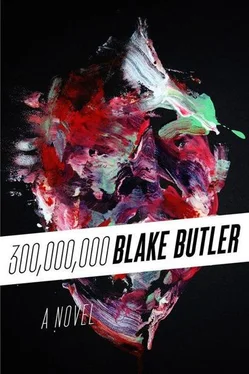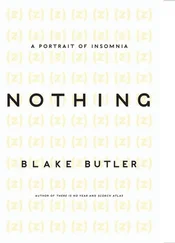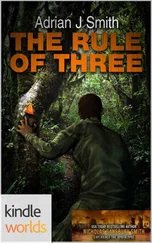Something in this room begins to shake. This room where you are sitting with your hands before you, reading. You don’t hear it because I said that it began. You refuse to take part in trying to hear thereafter because I’m talking about you directly to you and this object is a book. You don’t like the idea of me communicating through you, outside of time. But there is something. In the room. Shaking. Behind your back, or just downstairs, or maybe by the window where you sleep, or in the curtains, soft as hair.
What is shaking.
Will you hear it.
In the room where he is, Flood does; he hears the shaking like I have heard, though to him it feels like it’s inside him.
Is it inside him.
I think someone is at your door.
Flood is grunting. His torso seems above his head. His head feels above his ass. His ass feels opened. There is no light, but for where above him in the spinning, he can feel the low glow of the room somewhere above him, then below him. The black is gyroscopic. He’s all wet now. He feels a cursor blinking in his chest. If he’s not moving, he can’t seem to keep one way clearly up above him. If he’s falling, the air here has a floor, one indifferent to direction, shape, or time.
Flood, Gravey says inside his cell alone. Flood, he says. Flood, he says.
A blue lesion has pulled open on his back between his shoulder blades. It is too small to be seen by humans.
The lesion seems to change shape when looked at. Inside this shape there is a city, like the city you are in. The city is unfolding.
Gravey exhales into the larger air.
Today in America unknowing each speaking person will emit a common word.
LAPUZIA: I go by Flood’s residence on my way home from the precinct. I don’t let anybody know I’m going, because I want to approach as a friend, not as a coworker. I’m worried about him, to be honest, and not just his career but his mental and emotional well-being. I find his front door left unlocked and halfway open. I immediately notice a strange smell, but I don’t associate it with where I have felt it from until I come into the front room. There are mirrors on the floor. Mirrors on the walls and on the ceiling. Several dozen lights light the room wide. I am so shocked at first I start to call for backup, but something stops me. Still, I ready my firearm. I go on into the larger room. Spread out on the floor where one would usually have a sofa etc. I find a series of pictures of B., Flood’s deceased wife. There are pictures of her alone and smiling, her with E. N. in various locations, and so on, hundreds of them, just everywhere. And there are papers. Papers of his writing, some of which are copies of ones I’ve seen before, that he’s brought to me, others I have not, and some written in a script that doesn’t look like English. Drawings of odd symbols are on many of the pages. I continue on into the apartment, terrified of what I’ll find, though in the other rooms nothing is strange. No evidence of struggle or wrongdoing. No bodies, thank god, and no blood. The main closet is still full of B.’s old clothes, and this is where I realize there’s this odd smell snaking on the air. It is a perfume, sprayed so many times into the small room it’s hard to breathe. Hours later I knew for certain I had felt the presence of this choking, slaving smell before, sometime when I was very young, inside my sleep, but this does not occur to me at the time. I come back out into the main room. I stand among the pictures and the light. I decide there’s no reason to report this, that I should not have come here, that I feel older than I ever had all through my blood. I feel dizzy in the middle of the photographs of her, the mirrors, a silent catacomb of eyes. That’s when I realize I’m being recorded .
FLOOD: You and everyone who’s ever been. This is not a question of being destroyed, or even beginning: it is in the folding there between: the color of the mesh of the lives forced into bodies rendered one unto the other, lobes in the catalog of time. Each body not a body but a cell . I did not write this.
The body before the glass screen watches white.
He or she before the screen watches the white recorded into the image of the video not go on, not shift or change its vision, unless it bears an image hidden underneath itself: white upon white, making more of what it was and is and will be. Spitting up upon itself more of itself. No mirror. No hour. The white of a white loom.
He or she, assigned to duty, must watch the film to find where inside it there might be something as yet undetected, evidence buried in the film filmed by a man who may or may have not used his hands to end several hundred human lives. He or she may feel emotion in regard to the gone bodies even not having known these victims beyond their humanity after the fact, but regardless time continues, the white continues. The end of one life or another on any given day cannot end all lives, we think. We must go on. This is both the song and city of the human, to continue, we know, and so he or she must.
He or she sees.
He or she is a she here in this instance but as well may be a he or she as in the end it does not matter.
Before the screen he or she has already spent many hours looking. He or she has nodded off to sleep throughout an unknown number of tapes, which continued playing on during the period without he or she realizing he or she had slept, and so not seen, the present seeming in his or her head to be one continuous waking session of watching the tapes, when in fact the session is corrupt. What had been shown had not been entirely denoted, quantified for what had passed over the closed eyes. The aging of all flesh continues to go on regardless, without sound.
The waking body sees the white again. It appears nothing has happened. Nothing, then, has happened. He or she marks another mark upon a page, a sentence notating nothing has happened, and is happening now. Nothing is happening.
The waking body drinks a glass of milk. The milk is warm from where it’s been left on the table for some duration of the day; its opaque color had stayed there unchanged in its state during the period in which he or she had nodded off, a half-full glass of whole milk. He or she does not mind the warmth of the waiting milk, or that in drinking he or she must assume the milk is fine to drink; he or she has had experience with milk, and so anticipates a somewhat innate awareness with its content.
The milk enters the body with the body’s eyes rolled back into the head; again, as with the sleeping and other blinking, he or she is cut again from seeing what appears on screen. He or she, in waking presence, assumes by now that the screen is always only presenting more of the white. One would have to assume, having seen most of the white surrounding any instant of the white oncoming, that any present instant must also be white, otherwise life in this context would become almost impossible to live through, or at least impossible to feel having gotten anywhere in. For the most part then one must go on as if anything unseen could not be interrupting its own continuity in whatever incidental gaps of time it wasn’t witnessed, until a point inside the white that the oncoming white ceases to be white in such a way that cannot be ignored, waking one into the understanding that all these hours might not be just blank, but somehow haunted, embodying some terror so large it at most points could not be seen from so close up.
So then having mostly watched, the thing is considered watched ; this is the nature of the assignment: to find by seeing mostly all the white where it might be that white is not. If there is nowhere that the white is not, then the assignment will have been an exercise in finding nothing, which herein will go unrewarded, beyond hourly pay — paid cash to live his or her life with, and his or her family’s, if he or she has one, their bodies stuffed with food and air inside of rooms earned by the doing of the seeing of nothing.
Читать дальше












